Isao Tamagawa
Nascimento : 1922-01-11, Shinjuku, Tokyo, Japan
Morte : 2004-01-01

A semi-autobiographical film about a young man from Tokyo who moves to Hirosaki in the early Shōwa era. A straight-to-video production made for the Hirosaki Senior High School Alumni Association that also incorporates footage from contemporary Hirosaki, and features cameos by regular Suzuki performers like Tamagawa Isao and Nogawa Yumiko.

Japanese comedy film.
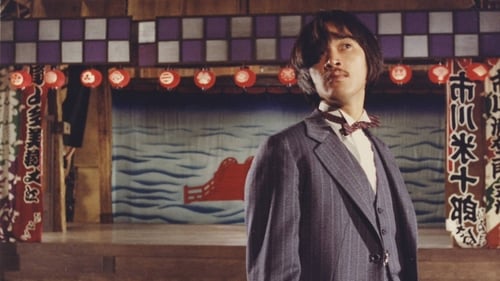
Clerk
Tóquio, 1926. Shunko Matsuzaki é um dramaturgo de teatro shinpa (moderno), e tem como mecenas o poderoso Tamawaki. Um dia, ele se depara com a bela Shinako numa ponte. Ela pede que Matsuzaki a acompanhe até o hospital para fazer uma visita a uma mulher moribunda. Ela deseja sua companhia pois tem medo de encontrar uma senhora vendedora de fisális, fruta que supostamente contém as almas das mulheres. Matsuzaki recusa, mas Shinako retorna em outras aparições, e torna-se sua amante. Em seguida, ela desaparece. Tempos depois, Matsuzaki descobre que Shinako pode ser o fantasma de uma antiga esposa de Tamawaki. Depois de receber uma carta de Shinako, Matsuzaki viaja para Kanazawa a fim de encontrá-la. No trem, ele encontra Tamawaki, que diz que está viajando para presenciar um suicídio por amor. Segundo filme da “trilogia Taisho,” que segue o mesmo estilo alucinatório do primeiro.
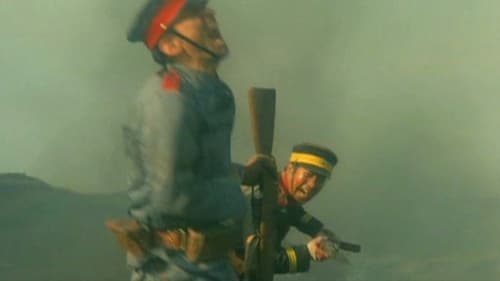
Kanemoto Matsumura
Retrata o cerco sangrento da fortaleza de Port Arthur, uma das posições mais fortemente fortificadas do mundo, durante a Guerra Russo-Japonesa de (1904 - 1905). Na história dominou o personagem Ten Takeshi Kogyo (Teruhiko Aoi), professores e um oficial da reserva que se tornou comandante do pelotão e posteriormente da companhia. Paralelamente, acompanha a conduta do comandante do exército general Nogi (Tatsuya Nakadai), que foi comissionado do imperador Matsuhito (Toshirô Mifune) para a conquista do forte.
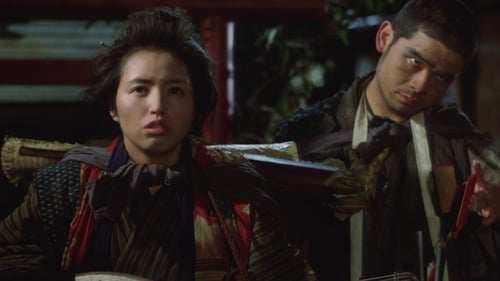
Doctor Amaki
Aochi, um professor universitário de alemão, encontra com seu antigo colega Nakasago quando viaja de férias para um vilarejo à beira-mar. Nakasago vive como nômade e é perseguido por um grupo local, acusado de ter seduzido e assassinado a mulher de um pescador. Depois que Aochi resolve a situação do amigo com a polícia, os dois jantam e conversam sobre a vida, acompanhados pela gueixa Koine. Seis meses depois, Aochi volta para visitar o amigo e descobre que ele está casado com Sono, uma mulher incrivelmente parecida com Koine. Repentinamente, Nakasago foge com Koine, abandonando Sono, que está grávida. Mas tudo pode ser sonho, delírio ou realidade. Acompanhando a trama, a peça musical “Zigeunerweisen” (1878), de Pablo de Sarasate, toca com insistência. Primeiro filme da “trilogia de Taisho,” que faz referência ao Japão dos anos 1910-1920, foi vencedor de quatro prêmios da Academia Japonesa em 1981, incluindo os de Melhor Filme e Melhor Diretor.

High school student Keiko struggles with the pressures of college entrance examinations and a chaotic home life, ultimately succumbing to alcohol, marijuana, gang members and rape.
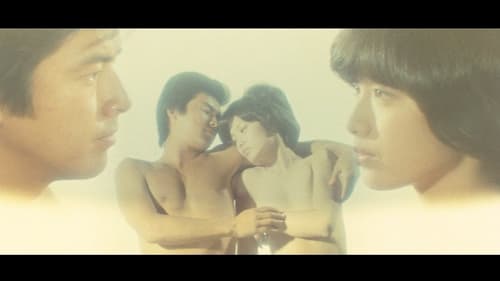
Kyoko met Tetsu during her trip to San Francisco. Soon they fell in love but getting married was not in his mind. They were to meet again back in Tokyo but Tetsu didn't turn up. She went to look for him in San Francisco but all she found was him with his new girlfriend. Kyoko went back to Tokyo and eventually married a big corporate CEO...
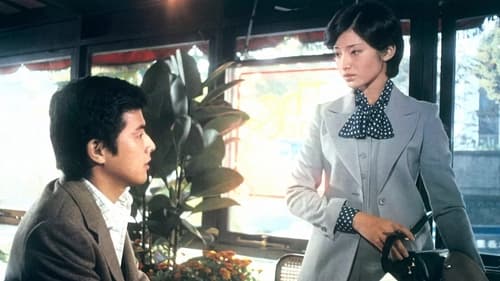
Detective Oka
Masao is falsely accused and jailed for the murder of a loanshark to whom he owed a lot of money. His sister Kiriko makes the long trip to Tokyo, specifically to accost Otsuka, Japan's top criminal defence lawyer, and plead with him to take her brother's case. They live in Kitakyushu which, though a city, she contends that the local lawyers are not up to the job. Otsuka contemptuously brushes her off. A year passes. Masao has suicided in jail, his appeal having failed due to the lack of interest and competence of the local defence lawyer. Kiriko returns to Tokyo, planning revenge on Otsuka for refusing the case and causing her brother's death.

Detective Geta
Komori Tiaki is a budding tennis student, however one day in training her coach hits the ball into her eye accidentally. She is taken to hospital but it advised that she will never regain the sight in her eye. Her coach knows of a mysterious doctor 'Blackjack' who lives in a secluded house, who might be able to help. 'Blackjack' agrees to do the operation, but for a 'substantial reward'! Her sight is regained, but now she starts to see a mysterious man that is invisible to those around her....
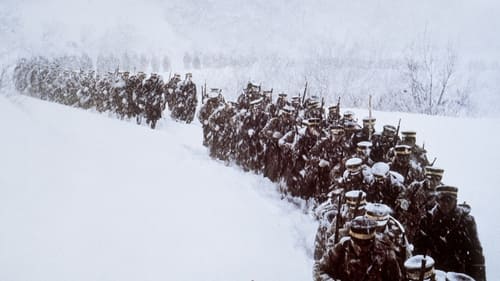
Captain Okitsu
Two infantry regiments of the Imperial Japanese Army—210 men overall—tackled Mt. Hakkoda in the winter of 1902 to prepare for war with Russia.

Mori
A model must cope with the stress of fame after a marketing executive transforms her into a sports celebrity.

Utamaro was an artist who lived in Edo (which was later to become modern-day Tokyo) in the late 18th century. This film, which has a complex and wide-ranging storyline, recreates the world of that time, as it appeared in Utamaro's paintings.

Tomoda
Japanese crime film.
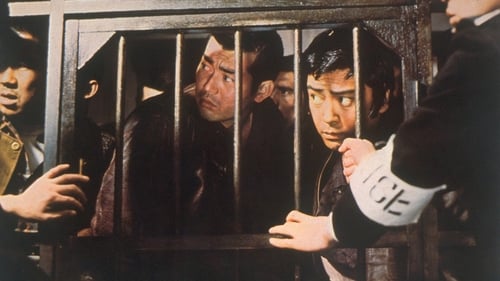
A look at the life of renegade yakuza, Rikio Ishikawa, particularly the years from 1946 to 1950 when his violent antics get him in trouble with his own clan, Kawada, and then with the clan of his protector, Kozaburo Imai. In these years, he can rely on Chieko, a young Tokyo courtesan who gives him shelter. He's banished to Osaka, where he picks up a drug habit. Through it all, he keeps his friends and enemies off balance with unpredictable behavior - and he seems indestructible.

A ryokan maid is on trial for pushing a familiar guest off a cliff to his death. An eager attorney offers to take the case to gain notoriety.
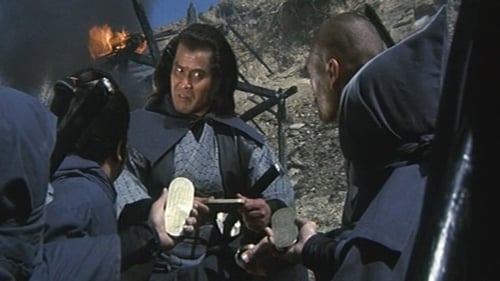
Set during the declining years of the Tokugawa shogunate, Shadow Hunters details the questionably noble exploits of three ronin who act as "Shadow Hunters". These three ronin are not your normal ornery ruffians who are looking for a drink, a broad and someone to jab a sword into, but are in fact former samurai who, rather than follow their destroyed fiefs and murdered masters into death via seppuku, have dedicated their combined sword prowess to stopping the government from raping its daimyos for valuable resources.
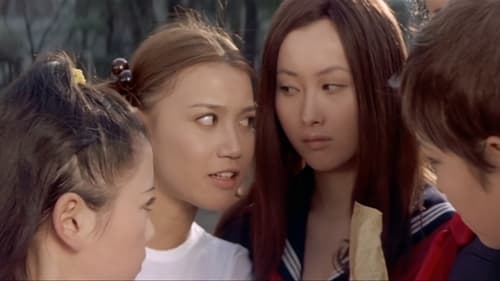
Sex games by students at a junior high school are exposed by the principal and teachers, but the tables are turned in favor of the students.

Authentic action drama of modern gangsters.

A Japanese racing driver for Nissan named Godai (Yujiro Ishihara) have a rivalry with a French driver named Pierre (Jean-Claude Drouot). Godai is enlisted to race in an annual endurance race, The East African Safari Rally. Peripheral to this is the story concerning Godai's former lover Yuko (Ruriko Asaoka), a fashion designer, and her friend Anna (Emmanuel Riva), who happens to be Pierre's wife.

A tale of wannabe yakuza youths. When not cooking up scams with his buddies, Zenkichi develops a crush on Taro's disgusted sister, Miki. But soon the young hoods run afoul of their underworld idols when they rob the wrong gang, led by brutal boss Konno. When Zenkichi's pals start to bite the dust, he hooks up with a more traditional yakuza, Tetsugoro, to retaliate.
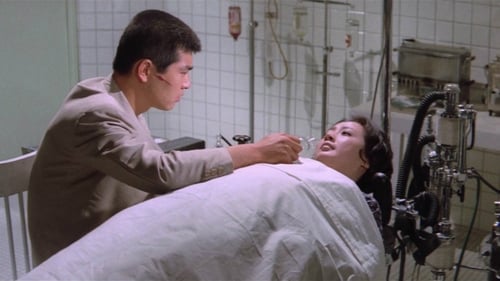
Gohara
Goro Fujikawa (Tetsuya Watari) was indebted to Mitsugimoto. Sawada, a low rank yakuza with a gambling problem owed Mitsugimoto three million yen. This equation can only lead to one answer. Mitsugimoto needs to pay and Goro's coming to collect.

Sayama
Kitagawa is an engineer charged with construction of a gigantic tunnel through the Japan Alps for the transportation of equipment in the building of the massive Kurobe Dam. The tunnel crosses an earthquake fault and Kitagawa is beleaguered not only by cave-ins and flooding, but by strife between management and the workers's union. Adding to Kitagawa's stress is the knowledge that as his attention is pulled inexorably toward the tunnel construction, his youngest daughter is dying from leukemia.
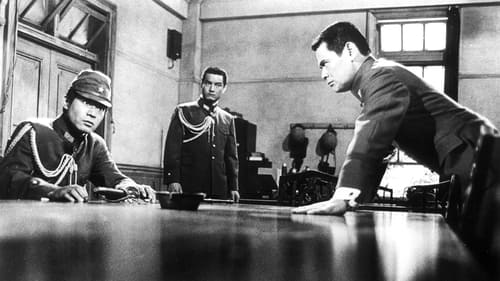
Colonel Okitsugu Arao - Chief of Military Affairs Section
Following the detonation of the atomic bombs on Hiroshima and Nagasaki, the Japanese military and the government clash over the demand from the Allies for unconditional surrender. Minister of the Army Anami leads the military officers who propose to fight on, even to the death of every Japanese citizen. Emperor Hirohito, however, joins with his ministers in asking the unthinkable, the peaceful surrender of Japan. When the military plots a coup to overthrow the Emperor's civilian government, Anami must face the choice between his desires and loyalty to his Emperor.
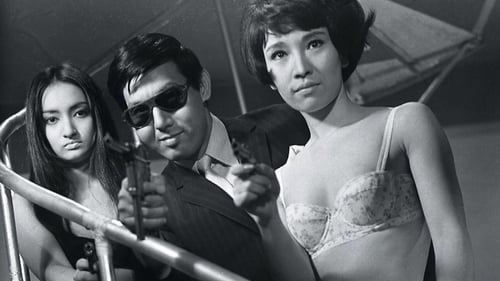
Michihiko Yabuhara
Ao fim de quase quarenta filmes como realizador em pouco mais de dez anos de trabalho, Seijun Suzuki foi despedido da Nikkatsu, lendária produtora japonesa. A causa, este "Koroshi no Rakuin", considerado pela crítica a sua obra prima, mas visto como incompreensível e inaceitável pelo presidente da companhia, Kyusaku Hori. O filme valeu-lhe um circense processo judicial pela luta dos direitos das suas obras. Ao fim de três anos de litígio, Suzuki, mais do que uma vitória merecida, conquistou o estatuto de cineasta de culto no Japão e um despertar das atenções a Ocidente. A década seguinte seria de exílio em trabalhos menores para a televisão.
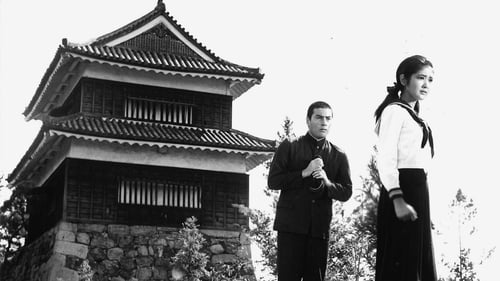
Principal
Kiroku boards with a Roman Catholic family and falls for the daughter Michiko. He ignores his feelings, joins a gang, gets in fights and, eventually, becomes involved with the radical Kita Ikki group.

Japanese war movie.
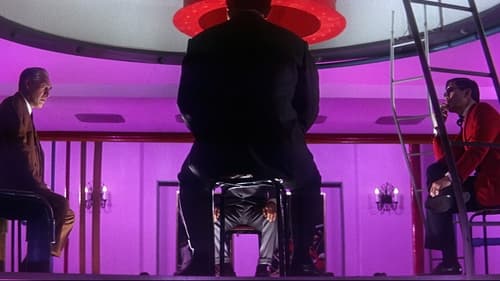
Umetani
Braço direito a Yakusa resolve abandonar a carreira criminosa com seu chefe, mas uma gangue rival não deixará que isso aconteça tão facilmente.

A film dealing with the trials and tribulations of a primary school before and after the Pacific War, set in Fukashima Prefecture.

Iwakichi Mori
The brother of an up-and-coming kendoka is mysteriously murdered while working on a new model of motorboat.

Narita
Uma prostitua é humilhada por um alto oficial do exército japonês. Ela resolve se vingar se relacionando com seu assistente, para manchar a honra do superior hierárquico.
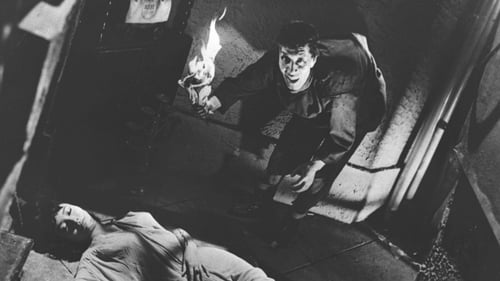
A hunchbacked caretaker presides over a forlorn mansion inhabited by the ghosts of his previous masters. An unbelieving trio (a doctor, his assistant and his niece) fail to heed the caretaker's warnings and are slaughtered horribly by the jealous occupants.
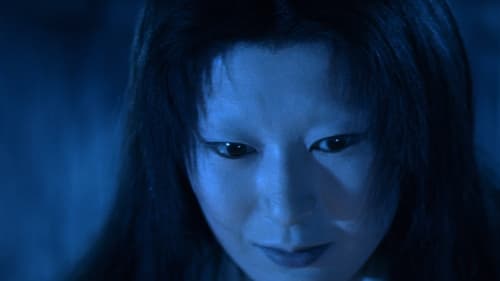
(segment "Chawan no naka") (uncredited)
Produção japonesa contada em quatro histórias. Em "Black Hair", samurai divórcia-se da mulher que ama para se casar com outra pelo dinheiro; em "The Woman in the Snow", lenhador encontra mulher congelada e o espírito dela aparece para revelar detalhes de sua vida, pedindo a ele que jamais conte a ninguém - mas dez anos depois ele esquece a promessa; em "Hoichi the Earless", o jovem e cego Hoichi vive num monastério e passa a cantar para fantasmas do império; e "In a Cup of Tea" fala de um escritor que vê uma misteriosa face refletida numa xícara de chá.

A dangerous mobster threatens the life of a businessman's mother in this thriller. As Ryuji oversees the building of a bridge in Japan, a powerful gangster plans to stop the project. By any means necessary.

Moriya Tomoko, a young girl working for a publishing company, is told by a woman art dealer that her real father did not die, as everyone believes, during the revolution in Cuba, but is now living in Japan. Tomoko's mother has remarried a strict, narrow-minded university professor, whose only worry is protecting his family name from the slightest blemish.

Horidome
Após a segunda guerra, nas favelas de Tóquio, algumas prostitutas adotam um código estrito de conduta.

Police Officer
Muraki, a hardboiled Yakuza gangster, has just been released from prison after serving a sentence for murder. Revisiting his old gambling haunts, he meets Saeko, a striking young upper-class woman who is out seeking thrills, and whose presence adds spice to the staid masculine underworld rituals. Muraki becomes her mentor while simultaneously coping with the shifts of power that have affected the gangs while he was interred. When he notices a rogue, drug-addicted young punk hanging around the gambling dens, he realizes that Saeko's insatiable lust for intense pleasures may be leading her to self-destruction.
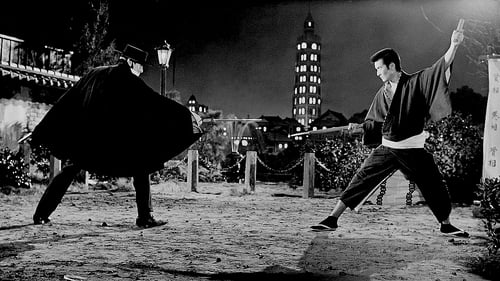
A young yakuza in love with the girl who's to marry his clan oyabun, kidnaps the girl before fleeing with her. In Tokyo, he hides under the identity of a worker while the young woman becomes a waitress in a restaurant.
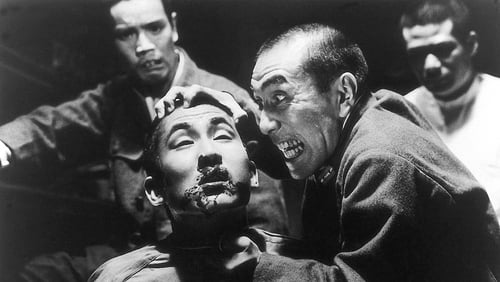
Director Jun'ya Satô's debut film focuses on the inhuman training of recruits, the brutal drill system that reigned in the Japanese army during World War II, where in the first two years of training, ordinary people were turned into inhuman killers. For his first film, the director was awarded the Blue Ribbon Awards in the Debutant of the Year nomination.

Ryohei Inoue
An investigation into a drug smuggler who is assassinated in front of an insurance building sets two detectives, Sumikawa and Akine, into a sprawling investigation through Tokyo's underworld.

Based on Kakuko Mori's autobiography, about her life and retirement from acting due to her increasing blindness.

Poor social conditions badly affect the relationship between a married couple, when the husband, who is desperately searching for work, fails to notice the terrible sacrifices made by his wife when she accepts a job at a local inn.

Moriyama



































